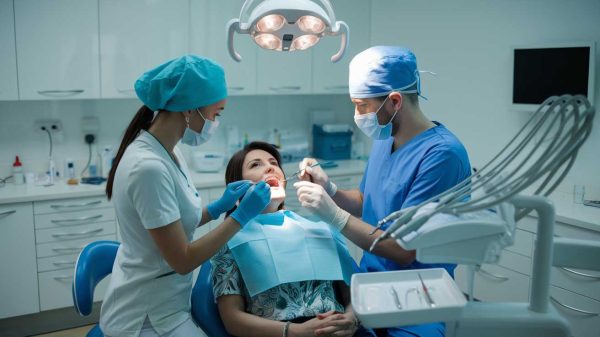
Dental implants or veneers : what’s the best option ?
Dental implants are a popular solution for replacing missing teeth. They offer a durable alternative to removable dentures or dental bridges.
Although this procedure has significantly evolved and is widely used worldwide, it comes with certain disadvantages and risks that patients should consider before proceeding. In many cases, dental veneers, especially those available in Turkey, can be a more advantageous alternative!
So, dental implants or veneers? In this article, discover the advantages and disadvantages of both options to make an informed decision!
Dental implants : principles and benefits
Dental implants are a modern and effective solution for replacing missing teeth, particularly when a permanent restoration is desired. Unlike removable dentures or bridges, implants rely on an artificial root inserted into the jawbone, acting like a natural tooth root.
Made primarily of titanium, a lightweight and biocompatible metal (well-tolerated by body tissues), implants are directly fixed into the bone through a process called osseointegration, where the implant gradually fuses with the bone.
Once the implant is placed and integrated, a custom-made dental crown is attached to complete the procedure.
Durability : a long-term solution
One of the main advantages of dental implants is their durability. When properly maintained, implants can last between 15 and 30 years, or even longer. Unlike removable dentures, which need periodic replacement, implants are designed to be permanent with minimal maintenance. Their longevity is one of the key reasons why many patients choose dental implants, even though their initial cost may be higher.
In fact, although they require a higher initial investment, implants can be more cost-effective in the long run since they do not require frequent replacement.
Comfort : a fixed and reliable solution
Comfort is another major advantage of dental implants. Unlike removable dentures, which can shift or cause gum irritation, implants are firmly anchored in the jawbone, eliminating any risk of slipping or discomfort while chewing or speaking. The lack of movement in the mouth allows patients to feel more at ease and to eat or speak with confidence.
Additionally, since the implant is directly integrated into the bone, it helps preserve the jaw structure and prevents bone loss, a common issue in areas where teeth have been lost. This ensures long-term dental function.
Aesthetics : a natural appearance
Dental implants are often chosen for their aesthetic appeal. The dental crowns placed on the implants are custom-designed to resemble natural teeth. They are made from high-quality materials such as porcelain or ceramic, which mimic the color, texture, and translucency of real teeth.
As a result, implants provide a discreet and aesthetically pleasing solution for replacing missing teeth without compromising the appearance of the smile. This is especially important for visible teeth, where aesthetics play a crucial role. The integration of implants is so natural that others cannot distinguish between a natural tooth and an implant-supported crown.
Dental implants are currently one of the most effective and durable solutions for replacing missing teeth. Their durability, comfort, and aesthetic appeal make them particularly attractive for those seeking a high-quality, permanent solution. They restore full dental function, a natural appearance, and improved oral health.
However, alternatives such as dental veneers can sometimes provide similar results, especially for cosmetic tooth correction. Each option should be considered based on the specific needs of the patient, and it is essential to consult a qualified dentist to determine the most suitable solution for your situation.
Disadvantages and risks of dental implants
Despite their benefits, dental implants have certain disadvantages and risks that may affect their success and longevity. It is important to be aware of these before making a decision.
Risk of surgical complications
Getting a dental implant is a surgical procedure, and like any surgery, it carries risks. These risks include:
- Infections: An infection may develop around the implant or in the jawbone, potentially leading to serious complications such as implant rejection.
- Bone perforation: In some cases, the implant may perforate the jawbone or damage surrounding tissues, causing pain and requiring additional treatments.
Long healing time
The dental implant process can be lengthy. Once the implant is placed, it typically takes between 3 and 6 months for the implant to properly fuse with the bone (a process known as osseointegration).
During this period, the patient may experience discomfort, pain, and sensitivity, sometimes significantly limiting daily activities.
Insufficient bone issues
For a dental implant to be successful, the jawbone must be strong and thick enough to support the implant. If the bone is too weak or too thin, proper osseointegration may not occur, requiring a bone graft before implantation, which adds extra costs and extends the overall procedure timeline.
High cost
Dental implants are one of the most expensive solutions for replacing missing teeth. Depending on the country, practitioner, and materials used, the costs can be prohibitive. The expenses include not only the implants but also consultations, X-rays, bone grafts, and crowns, which can quickly add up to several thousand euros.
Dental veneers : a simpler and more aesthetic alternative
Dental veneers are an increasingly popular alternative to implants, especially for those who want to enhance the appearance of their teeth without undergoing a complex surgical procedure.
Veneers are thin shells made of porcelain or composite resin, bonded to the surface of natural teeth to correct imperfections such as damaged, discolored, or misaligned teeth.
Advantages of veneers over implants
Veneers offer several advantages over dental implants, including:
- Less invasive: Unlike implants, which require surgery, veneers only involve removing a thin layer of enamel from the natural tooth, making them a less invasive option.
- Aesthetic appeal: Porcelain veneers are highly aesthetic and can be designed to match the color and shape of natural teeth, providing a very natural-looking result.
- Lower cost: Veneers are generally more affordable than dental implants. While they are still considered an investment, they can be a more cost-effective solution for those looking to improve the appearance of their teeth without undergoing expensive surgery.
Why choose veneers in Turkey ?
Turkey has become a popular destination for dental treatments, including veneer placement. The country offers high-quality services at significantly lower prices than those in Europe or the United States. Many patients travel to Turkey to receive top-tier treatments while substantially reducing costs.
Turkish dental clinics are equipped with the latest technology and are often run by specialized dentists with extensive international experience.
In addition to cost savings on treatments, Turkey boasts modern infrastructure and high-quality services, attracting an increasing number of international patients.
Disadvantages of dental veneers
While dental veneers offer many advantages, it is important to note that they are not suitable for everyone. They are primarily intended to correct cosmetic issues and are not a viable solution for missing teeth or severe chewing problems.
Moreover, unlike implants, veneers do not correct functional issues such as tooth structure loss or mobility.
Veneers can also wear down over time, especially if exposed to hard foods frequently or if the patient grinds their teeth at night. However, unlike implants, veneers can be easily replaced or adjusted if needed!
Conclusion : are veneers the ideal solution ?
While dental implants are a proven and long-lasting solution for replacing missing teeth, dental veneers offer a simpler, less invasive, and often more affordable alternative.
Veneers effectively correct cosmetic imperfections, and the options available in Turkey provide high-quality treatments at competitive prices.
If you are looking to enhance the appearance of your teeth or address minor imperfections without undergoing extensive surgery, veneers may be the ideal solution. Before making a decision, it is crucial to consult a qualified dentist to assess your needs and determine which option is best for you.

Dr. Levent Acar - Docteur